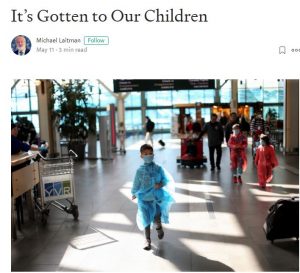
It started with the sick and elderly, but no one was alarmed. Then healthy elderly began to die and we got slightly worried. After some time, grownups in their 50s, 40s, and their 30s started to get sick and die, and we realized we had to do something about it, so we took up social distancing and stayed at home.
We didn’t get the message that it sent, we only feared for our health so we went on lockdown until the pandemic subsided and we could come out again. But we didn’t get the message: Stay away from one another; you are not good to one another; you are mean to one another so stay away. But when the infections decreased and we still didn’t learn, we started easing the lockdown and reopening the economy.
So now, the coronavirus is touching our children. In Europe and the US, children are becoming sick and dying of COVID-19. Soon, it will be around the world, or as NY Governor Andrew Cuomo put it, “Today, we must consider that an outbreak anywhere is an outbreak everywhere.”
Indeed, the key to solving the COVID-19 crisis is to understand that we are an integral, interdependent society. We are past the days of local, regional, or even national solutions. Everything today is global: the economy, the media, the pollution, and the pandemic. The sooner we comprehend this, the sooner we will resolve this crisis.
There is not a single problem that we couldn’t solve in the blink of an eye if we’d only realize that we are connected around the world. There is more than enough food to feed all of humanity, but we prefer to throw away the food we make but cannot sell. There is more than enough money to guarantee everyone’s minimal standard of living, but we prefer to keep our money to ourselves and let the poor and hungry fend for themselves. There is more than enough fuel to keep everyone warm in the winter, cool in the summer, and healthy all year long. There is a powerful internet network we could all use for education and entertainment, but we don’t want to share our benefits.
We amass, and amass, and amass, while others keep losing more and more of the little they have already until they can no longer sustain themselves and become weak and sick. And when that happens, it finally affects all of us. It makes no difference where the virus appeared first, since it didn’t really appear anywhere in particular; it appeared in the sick humanity that we have become. We are sick in our attitude toward each other, and therefore sick in our bodies from each other.
It is time to stop suffering. It is time to reestablish society and provide each human being with the staples for life, and with the knowledge of our interconnectedness. It is time we all, as a society, realize that our attitude toward each other and toward nature is sickening. Not only in the moral sense, but very much so in the physical sense. We are sickening each other through our sick thoughts of one another. We wish others the worst, but we complain when others wish the same upon us.
The only way to stop this madness, heal our bodies, and heal our minds is to establish a complementary education system. It will not offer professional trainings. Rather, it will focus on our social skills. Not on our manners, but on our attitude. We will learn the benefits of positive thoughts about others and how to nurture them within us. We will learn about nature’s network of interdependency and how to build it among ourselves. We will see how nature preserves the balance in all its systems, how the systems maintain balance among them, and we will learn how to form our own social systems and how to cooperate harmoniously with other social systems. And finally, we will learn how nature maintains the health of every species, and how we can maintain our own health.
We must do this now, before more children die, before more people suffer needlessly, and before nature teaches us about interconnection through another painful blow.